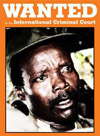
With operations by the Lord’s Resistance Army spanning several countries and swaths of dense jungle, hunting down the rebels requires excellent real-time intelligence—something long deficient in the efforts to bring the LRA to an end. In a new issue brief published by the Enough Project, LRA analyst. Ashley Benner, offers six reasons why intelligence about the LRA is difficult to collect and suggests six ways that the U.S. could address this challenge. The brief is the second in a series detailing the main obstacles to success in the hunt against the LRA and explains what steps the U.S. and its partners should take to redouble their efforts.
The challenge of collecting and applying adequate intelligence is driven by many forces. For example, the LRA fighters operate over a vast area in terrain that they know well and can maneuver in easily. Additionally, their operating structure, cells of 5-30 soldiers, makes them difficult to track, especially when trying to leverage aerial imagery through densely forested regions. The number of troops focused on tracking and ending the LRA also needs to be increased. Currently, only 2,860 troops make up the African Union Regional Task Force tracking and hunting the group, and only the Ugandan force is actively pursuing the LRA. The A.U. Task Force needs permission to operate in all areas where the LRA seeks refuge, including Kafia Kingi on the Sudan-South Sudan border. To respond to these challenges, the U.S. should take the following steps
- urge LRA-affected countries to deploy more troops for this effort;
- enhance the collection of human intelligence by working with local community groups in areas where the LRA is known to or has a history of operating;
- improve civilian protection, especially in the case of retaliatory LRA attacks;
- increase public awareness about the U.S. Rewards for Justice program;
- enhance the capabilities of satellite imagery and unmanned aerial vehicles to see through dense forestry; and
- obtain signal intelligence from LRA satellite phones.
President Obama has already shown leadership in leveraging U.S. resources to fight the LRA. On October 14, 2011, he announced that he would deploy a force of 100 combat-equipped U.S. forces to train, assist, and provide intelligence to help counter-LRA forces hunt down LRA leadership across the Central African Republic, the Democratic Republic of the Congo, and South Sudan. It is imperative that the U.S. renew its mandate to these advisors. In January 2013, President Obama included Joseph Kony and two other LRA leaders in the U.S. State Department Rewards for Justice program, which authorizes money rewards for tips leading to the capture of "foreign nationals accused by international criminal tribunals of atrocity-related crimes, and of individuals involved in transnational organized crime."
Despite these meaningful steps taken by the Obama administration, efforts to apprehend the LRA and protect civilians have fallen short. The U.S. should leverage its international weight, public diplomacy outreach, and intelligence technologies to mitigate intelligence challenges.
The first issue brief in this series focused on the challenge of access. The Ugandan army, the only force conducting offensive operations against the LRA, has been prohibited from operating in key areas where the group is located.
Related Stories:
- Open Letter to the President: Critical Steps for Obama's Second-Term
- 2012 Crisis Tracker Security Brief Highlights Trends in LRA Violence
- Defections from LRA Gaining Momentum

